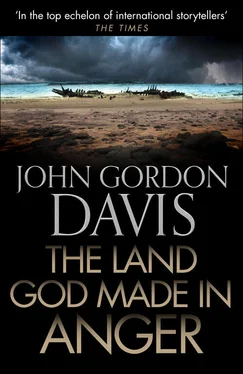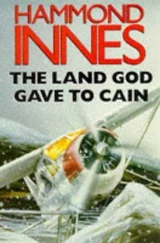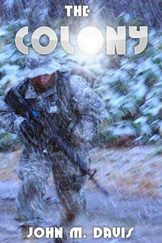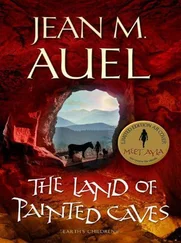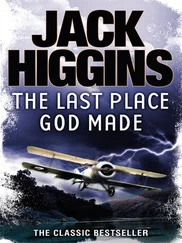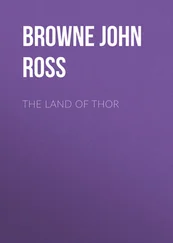Jakob shook his old head.
‘Do you remember the time when the great war ended?’
‘I remember hearing it was ended.’
‘Did this happen before or after that?’
‘After,’ Jakob said.
‘How long after? One month? Two? Four?’
‘Maybe one month.’
Oh yes, McQuade thought.
‘And was there water to be found in the river beds near the coast? If a man dug for it.’
‘If he dug for it he would find some water.’
‘And game?’
‘Yes, there would be some game near the river beds.’
So he could have got food and water. And he had a gun. ‘Why didn’t you take his gun?’
Jakob said, ‘I was frightened. I ran away. I did not think about the gun until afterwards.’
‘And the man’s front teeth were definitely broken?’
‘Broken.’ Jakob pointed at his own gums.
So he was in pain for a long time, McQuade thought, so the first thing he would have done when he reached civilization was go to a dentist. ‘Can you describe this man? How old was he? Was he younger or older than me?’
Jakob glanced at McQuade. ‘About the same age.’
‘And how old am I?’
‘Maybe you have forty years.’
Not bad, McQuade thought. That meant that if H.M. had survived, he would now be an old man of about eighty. ‘What colour hair did he have?’
Jakob pointed at a dark rock.
‘Was his hair curly or straight?’
‘Straight.’
‘Eyes?’
Jakob indicated his own eyes. ‘Brown.’
‘Anything else? Scars, for example?’
Jakob shook his head. ‘I saw no scars.’
‘What was his nose like? Broad; thin, straight, crooked?’
‘It was straight, like yours.’
‘How was his mouth?’
‘He had thin lips.’
‘How was his chin? Did it have a dent, like mine? Or was it round, like yours?’
Jakob thought. ‘I think it had a dent.’
‘How tall was he?’ McQuade stood up. ‘Taller than me? Or shorter?’
Jakob stood up. He compared McQuade to himself, then touched the tip of McQuade’s shoulder.
That’s short for a white man, McQuade thought. He himself was six foot so H.M. was about five foot three or four.
‘And was he fat, thin or average?’
‘He was not fat, he was not thin.’
‘Did you get anything else from the dead man apart from the cross and the tag? A piece of paper, maybe? Another wallet?’
Jakob shook his head. ‘Nothing.’
‘And what did this man look like?’
Jakob said: ‘He was dead. His face was covered in blood and sand. And the jackals had been eating him.’
‘All right. Now please –’ he was going to say ‘be honest’ but changed it, ‘– please think carefully. Was there anything else in the wallet apart from the white money? You can tell me without fear. Was there a card, perhaps? Some papers?’
Jakob glanced away. ‘Nothing.’
McQuade thought he was lying but let it go for the moment. ‘Did you ever exchange any of the white English money for our money?’
Jakob said emphatically: ‘No.’
McQuade knew he was lying. Four hundred and eighty-five is an untidy number of forged English pounds. But only a few people had trusted the strange-looking money. ‘Why not?’
‘Because I was afraid the police may say I stole it.’
McQuade nodded. ‘How many people know about this story, Jakob?’
‘I told only my wife and my son.’ Jakob gave a truculent glance at Skellum.
‘Did Petrus keep anything taken that day?’
‘He did not want anything.’
‘And how did Skellum get hold of it?’
‘He stole it! From my hut!’ Jakob said indignantly.
‘When?’
‘Last month he ran away. Later I found he had stolen these things.’
Skellum was sitting against the hut wall, a big bruise on his temple, one eye swollen, looking murderous. McQuade wanted to ask him how many people he had told the story to, but didn’t think he would get any truth from Skellum. Now for the all-important question.
‘And can you remember the place on the shore where the white men came out of the sea? The exact place?’
Jakob glanced at him. Then looked away.
‘I do not think I remember.’
‘But why not? Damara people remember the eyes of a buck they shot fifty years ago!’
‘Because the coast walks.’
This was true. The Skeleton Coast changes, the winds and tides slowly shifting the great expanses of sand, so that old wrecks are sometimes found buried hundreds of yards inland. McQuade burrowed his hand into his pocket. He counted off four fifty-rand banknotes elaborately. He held them out to Jakob.
‘Please take me to this place.’
They drove back through the scrub-rock hills towards the Skeleton Coast, stones flying from the wheels, dust billowing up behind. McQuade wanted to make the coast while the sun was still high enough to use the sextant. Then the yellow-grey hills gave way to the rock mountains heaped up on the horizon, iron-brown and shimmering under the merciless blue sky. It was afternoon when they reached the ranger’s post at Springbokwasser, midst a clump of reeds. McQuade got a twenty-four-hour permit.
They drove on. Slowly the iron-brown mountains gave way to the flinty dunes, grey-brown and yellow. McQuade said to Jakob:
‘This man spoke in German. You understand German?’
‘I understand many words.’
McQuade said: ‘How was it when the Germans ruled this country?’
Jakob stared through the windscreen. ‘ Sleg ,’ he said. Bad.
‘Why?’
Jakob shook his head. ‘Twenty-five lashes. And if the whip does not whistle that lash does not count.’ He added: ‘Blood.’
‘For what offence did people get twenty-five lashes?’
‘For anything.’ He added: ‘For falling down. Even women and children.’
McQuade frowned. ‘Why did they fall down?’
‘Because the loads were too heavy. When the Germans were building the harbour at Lüderitz. I was a boy then.’
‘Were you ever lashed?’
For answer Jakob pulled up his shirt. His back was a mass of scar tissue.
McQuade was shocked. ‘For what offence?’
Jakob said: ‘The sickness of hunger. And the cold.’
‘But did they not feed you enough?’
‘There were no crops. The Germans had killed very many men in the wars, and so no crops were planted. The women and children had to build the harbour because there were no men left, but there was no food because there were no crops.’
McQuade did not believe this. The old man was repeating folklore. History was not McQuade’s strong point, but nobody had taught him this at school. He knew something about the German colonial war against the Hereros, and presumed it was a pretty bloody affair, as wars of pacification were in that era. What about the Red Indians in America? What about the Aborigines in Australia? But he did not believe this story about women and children being worked and starved and lashed by the Germans of South West Africa.
The gravel-encrusted hillocks gave way to the yellow sand dunes, row after jumbled row, going on and on: then, way ahead, a haze came onto the horizon and then the mauve-black of the Atlantic.
McQuade stopped where the road joined the coastal track. He made a note of the mileage, and said to Jakob, ‘Which way?’
Jakob pointed left. South.
‘Are you sure?’
‘Sure,’ Jakob said.
But Jakob was not so sure. On his instructions McQuade drove off the road half a dozen times in the next two hours, grinding down to the shore, and then along it, while Jakob peered all around for landmarks. He said he was looking for a promontory of rocks sticking out into the sea. It was after four o’clock when he pointed with conviction.
Читать дальше
